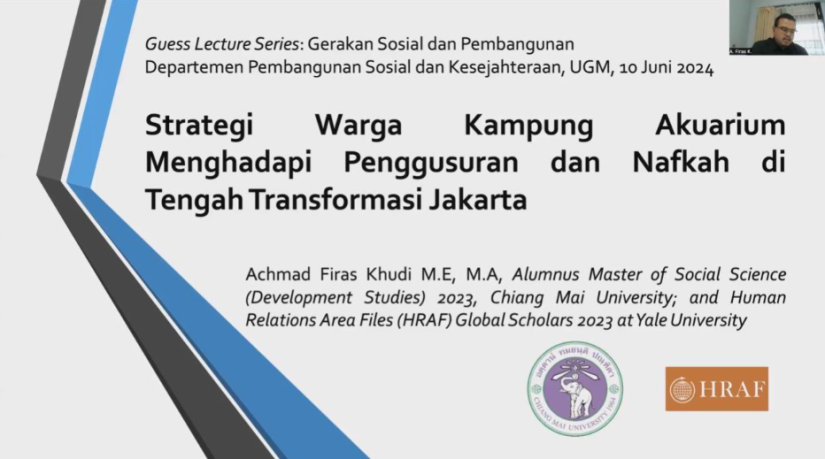
Yogyakarta, June 10th, 2024–To deepen the knowledge of college students about the issue of Social Movement and Development, the Department of Social Development and Welfare has organized a guest lecture with the topic of “The Sociopolitical Constellation in the Kampung Akuarium Social Movement”. With the case study of Kampung Akuarium, the guest lecture supports the depth of understanding related to Social Development Goals (SDGs), particularly SDG 11 Sustainable Cities and Communities.
The attendance of Ahmad Firas Khudi, an alumnus of Chiang Mai University, provides a clearer picture about the dynamics of the residents in Akuarium post-eviction and its rebuilding
Before 2016, the residential area, which accommodated more than 300 families, were evicted and then rebuilt in 2021 with the name Kampung Susun Akuarium. According to Firas, the rebuilding of the residential areas after the evictions creates a paradoxical experience for the residents. In his research titled “Strategy Against Eviction and Livelihoods of the Akuarium Neighborhood in Jakarta’s Transformation”, Firas noted that the residents’ response to the transformation there has impacted the economy and the mobility of the residents.
“The economic base and the community have been destroyed. But the daily resistances and pragmatic social movements with the motive of development have instead increased,” Spoke Firas in his lecture.
From the daily resistances, the class struggle done by the residents of Kampung Akuarium does not happen on abstract matters, but on much more real stuff in their everyday life. This phenomenon has occurred because the evictees’ homes are not merely their place to stay. But, it is also a productive asset that has economic value. When eviction happens, structural problems will appear and so, it will have an impact on the participation or the movements that are pragmatic and opportunistic.
Social movements that are interpreted by bodily actions, struggle through the socio-political networks, or the economic resilience built by society itself can give a real picture of resistance.
“This pragmatic movement that came from ordinary everyday lives, when compared to something abstract, is much more real and it can picture resistance,” said Pinurba, the supporting lecturer of the course.
Albeit, when pragmatic movements does occur, the sustainability from social movements become fragile.
“So, things I said earlier was right, that political directions are decided by social political conditions that are developing at the moment. It is pretty dynamic, especially when we talk about cities,” Purba added.
